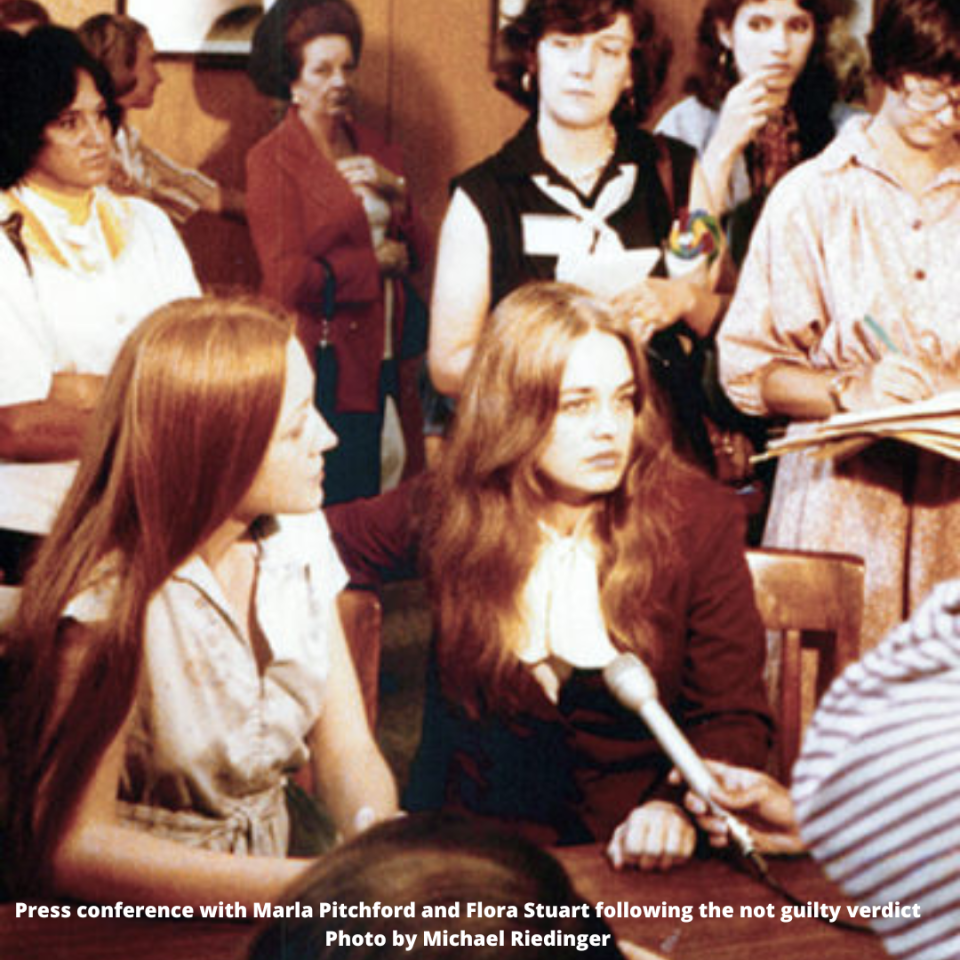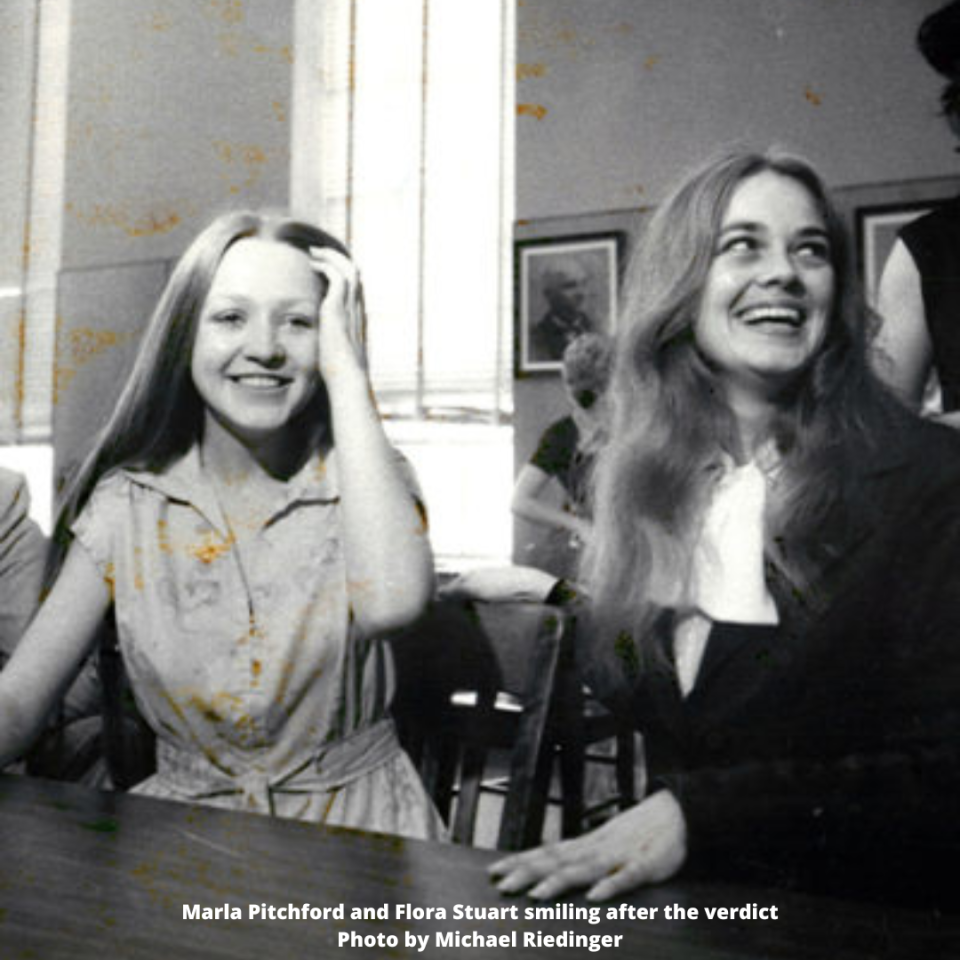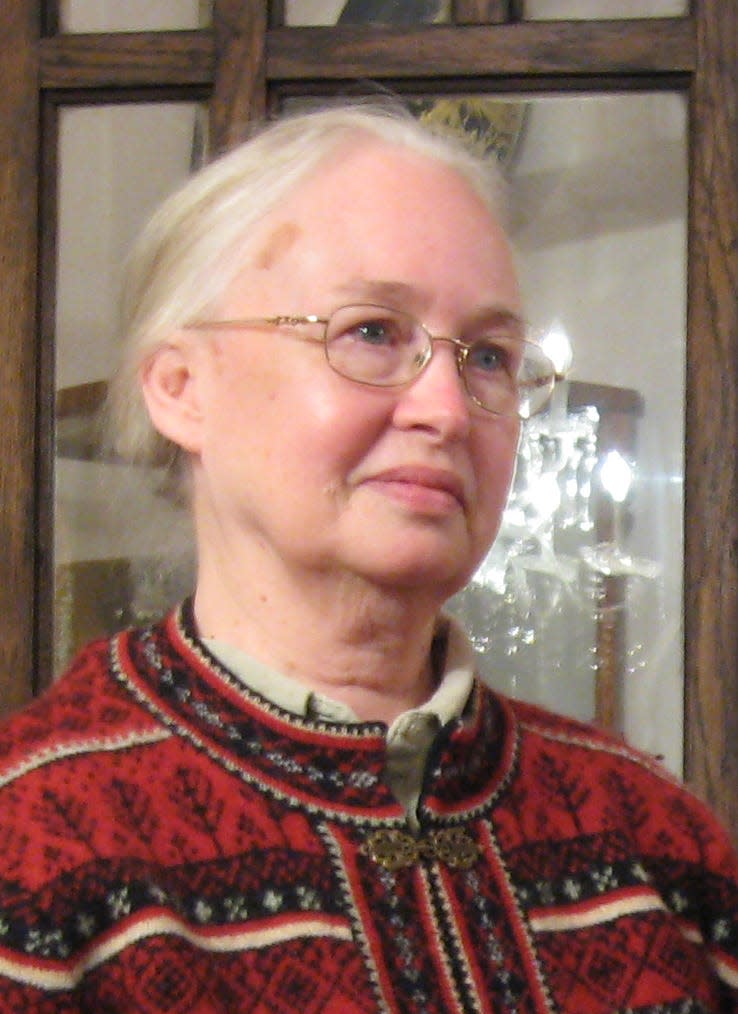The criminal abortion trial that happened in Kentucky in 1978 and why it matters
Forty-four years ago, a college student lying semi-conscious in a hospital bed confessed to police: “After being told my pregnancy at 22-24 weeks was too advanced for a safe abortion I attempted to perform the abortion myself. I put a knitting needle in my uterus…I had no way out. I felt like dying.”
Marla Pitchford was indicted in 1978 by a grand jury for manslaughter and performing an illegal abortion. According to Kentucky law (KRS 311.750) still in effect, the performance of an abortion by other than a licensed physician is a felony with a penalty of 10 to 20 years in prison.
Marla was only 22 years old and would walk away from the courthouse a free woman. But the path to get there would not be easy.
Her lawyer, my sister, Flora Templeton Stuart recalls the case: “One day a young woman came to me for representation. As I learned about Marla’s situation, I felt a kinship with this young woman. Marla’s cause became my cause.”
Roe v. Wade is overturned: Here's what abortion laws look like in each state
Before the trial
Stuart and her co-counsel, Kelly Thompson, moved to dismiss the charge of manslaughter, which violated Roe v. Wade that the fetus was not a person. I remember Morris Lowe shouting “This woman killed her baby!” In light of Roe, “Miss Flora” as she was addressed by Warren Circuit Court Judge J. David Francis, dismissed the manslaughter indictment, leaving the charge of performing an abortion without a licensed physician.
Defense attorneys announced they would plead temporary insanity at the time the offense was committed. This was not well received in some feminist circles since it was argued it did not further the cause of women’s rights.
After I contacted the editor of Ms. Magazine, calls came in from National Organization for Women and Kentucky Abortion Freedom League. While the former was very helpful the Kentucky pro-choice group wanted Marla convicted to enhance their cause with a test case. Stuart was only interested in an acquittal.
Opening arguments
First, the prosecutor laid out the facts focusing on Marla’s confession.
Stuart laid out the tragedy of a young woman who dreamed of wearing a white wedding gown rejected by her boyfriend. “You will hear this tragedy unfold in this courtroom. I only ask that you place your heart in the heart of Marla Pitchford.”
“I remind you that never before in the history of this nation has a female been put on trial for abortion—quacks, yes! But not the woman. Bowling Green is a compassionate community, and we will shed our mercy on Marla Pitchford.”
The courtroom was packed with major TV networks covering the trial. Reporters from Time magazine and Newsweek were present.
The prosecution
While the defendant wiped back tears, the prosecution read the confession Marla had made in the hospital. In a dramatic moment, Morris Lowe called her boyfriend, Dwight Mundy to the stand.
Stuart: “Is it true that you dumped her? You drove her to the abortion clinic, and the whole thing was your idea?”
Mundy: “Yes. It was my idea, and yes, I did drive her. I couldn’t afford a child….”
In response to Lowe’s question, if he had anything to do with the abortion, his witness replied, “I had nothing to do with it.” Under cross-examination, Flora asked: “You mean you had nothing to do with getting her pregnant?”
Mundy: “I didn’t mean that.”
Later I read in a news report, that as Mundy went to his car, a group of women reporters surrounded his car, yelling at him as he drove away.
Joe Gerth: McConnell gets some blame, but Democrats deserve most for overturned Roe v. Wade

The Defense
To establish Pitchford’s state of mind, the testimony of Psychiatrist Lawrence Green was crucial to the defense of temporary insanity. The loss of cognitive function, as Dr. Green explained, does not mean that an individual is mentally ill, only that in a moment of extreme panic, the individual might be inclined to take drastic action.
The decision was made not to have Marla testify since such testimony would have been extremely painful for her while difficult to endure cross-examination. Marla’s only testimony was her sobs which could be heard throughout the trial.
Closing Arguments
The courtroom was filled when assistant prosecutor Tom Lewis argued that Marla Pitchford had confessed to the charges. “She placed a needle in her body; why not her heart?” he asked.
Speaking for the defense Stuart summarized the tragic events in Marla’s life, her hopes to get married and have a child: “In a moment of panic, Marla took the knitting needle and thrust it into her body. We heard from the psychiatrist of her state of mind. She wanted to tell the world she deserved to be punished.”
“This young woman,” she continued, “has seen her dreams of a white veil and wedding dress and love vanish in a sea of despair. Judas sold himself for silver. Dwight Mundy sold himself for convenience. It wasn’t convenient for him to have a child.”
Stuart then glanced from Marla to the jury.
“Who was the victim here?” After a pause, she likened Marla Pitchford to Hester Prynne in the book The Scarlet Letter. Time magazine characterized this moment in their article, Nation: The Scarlet A “It looked like a morality play, not a criminal trial. The sobbing 22-year-old defendant resembled Nathaniel Hawthorne's Hester Prynne, who, as Defense Attorney Flora Stuart reminded the jury, ”had to wear the letter A and bear the shame and humiliation.’”
Finally, Stuart asked, “Can you jurors deem a greater punishment for Marla than Hester received in the 1600s?”
More: Abortion ends in Kentucky as Supreme Court strikes down Roe v. Wade due to trigger law

The Verdict
Judge Francis instructed the jurors to return a not-guilty verdict if they found Marla Pitchford was of unsound mind at the time of the incident. When the jury found Marla not guilty by reason of temporary insanity, spectators clapped. There was joy in Bowling Green that afternoon, and even the prosecutors had smiles on their faces. “I am not unhappy with the verdict,” the assistant prosecutor said. It was his hope that the law would be changed as it was intended to refer only to fraudulent doctors.
There were headlines of the acquittal worldwide while Time magazine juxtaposed a picture of Marla alongside an almost look-alike drawing of Hester Prynne from the 19th-century Hawthorne text.
Lessons for Today
Without the appeal of a college student with whom jurors could identify, community support along with a dedicated defense team, and above all, without Roe vs. Wade, Marla Pitchford would have been convicted of a crime. The focus of her prosecution would not have been on the tragic situation of a young woman, but on the personhood of the fetus.
In the absence of federal protection of abortion rights, the way is paved for the banning of legal abortion completely in some states, and for limiting legal abortion to a mere 15 weeks in others. The effect of this loss on women’s rights is monumental. The new laws carry implications for women’s reproductive rights in general and will shape politics for decades to come. The prosecution of Marla Pitchford was the first time in the U.S. that a woman was on trial for performing an abortion on herself. But it will not be the last.
More discussion of the case can be found on www.florastuart.com.

This article originally appeared on Louisville Courier Journal: Roe v. Wade decision: KY's 1978 criminal abortion trial, what it means

